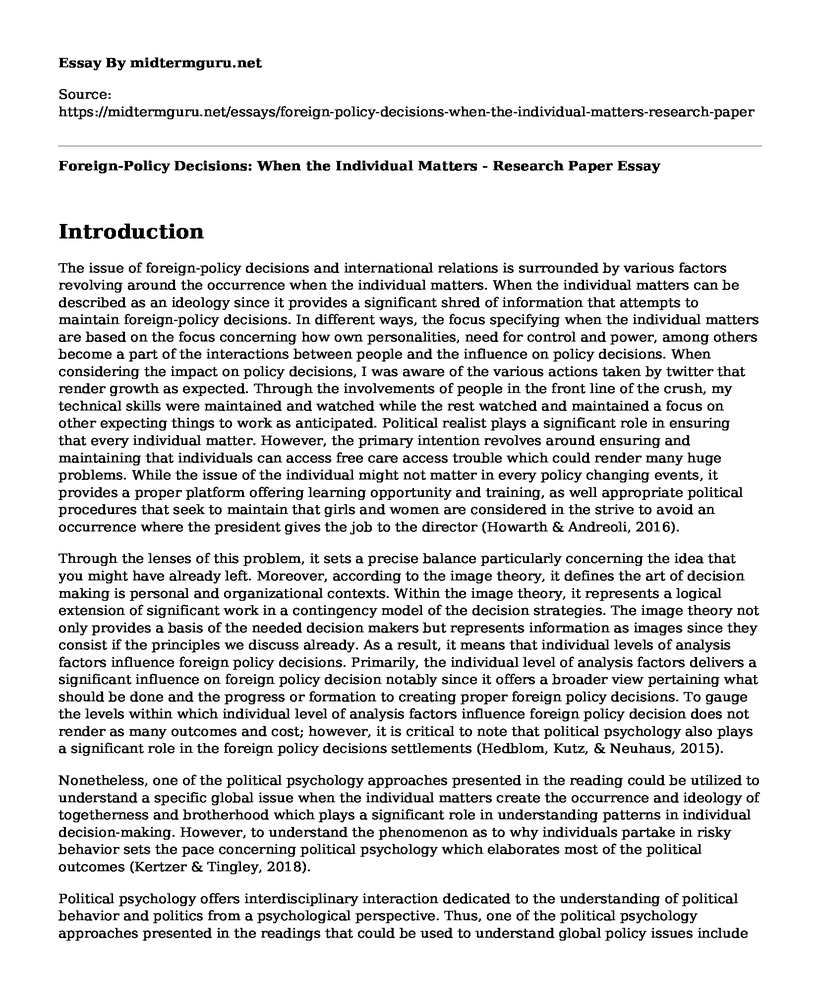Introduction
The issue of foreign-policy decisions and international relations is surrounded by various factors revolving around the occurrence when the individual matters. When the individual matters can be described as an ideology since it provides a significant shred of information that attempts to maintain foreign-policy decisions. In different ways, the focus specifying when the individual matters are based on the focus concerning how own personalities, need for control and power, among others become a part of the interactions between people and the influence on policy decisions. When considering the impact on policy decisions, I was aware of the various actions taken by twitter that render growth as expected. Through the involvements of people in the front line of the crush, my technical skills were maintained and watched while the rest watched and maintained a focus on other expecting things to work as anticipated. Political realist plays a significant role in ensuring that every individual matter. However, the primary intention revolves around ensuring and maintaining that individuals can access free care access trouble which could render many huge problems. While the issue of the individual might not matter in every policy changing events, it provides a proper platform offering learning opportunity and training, as well appropriate political procedures that seek to maintain that girls and women are considered in the strive to avoid an occurrence where the president gives the job to the director (Howarth & Andreoli, 2016).
Through the lenses of this problem, it sets a precise balance particularly concerning the idea that you might have already left. Moreover, according to the image theory, it defines the art of decision making is personal and organizational contexts. Within the image theory, it represents a logical extension of significant work in a contingency model of the decision strategies. The image theory not only provides a basis of the needed decision makers but represents information as images since they consist if the principles we discuss already. As a result, it means that individual levels of analysis factors influence foreign policy decisions. Primarily, the individual level of analysis factors delivers a significant influence on foreign policy decision notably since it offers a broader view pertaining what should be done and the progress or formation to creating proper foreign policy decisions. To gauge the levels within which individual level of analysis factors influence foreign policy decision does not render as many outcomes and cost; however, it is critical to note that political psychology also plays a significant role in the foreign policy decisions settlements (Hedblom, Kutz, & Neuhaus, 2015).
Nonetheless, one of the political psychology approaches presented in the reading could be utilized to understand a specific global issue when the individual matters create the occurrence and ideology of togetherness and brotherhood which plays a significant role in understanding patterns in individual decision-making. However, to understand the phenomenon as to why individuals partake in risky behavior sets the pace concerning political psychology which elaborates most of the political outcomes (Kertzer & Tingley, 2018).
Political psychology offers interdisciplinary interaction dedicated to the understanding of political behavior and politics from a psychological perspective. Thus, one of the political psychology approaches presented in the readings that could be used to understand global policy issues include image theory. As the image theory implies, it dictates that images provide a blueprint for the discussed policies and the decisions as well. Moreover, the political psychology approach maintains an understanding of the specific global issue since it points out the particular benefits as well as providing an example of the outcomes. For example, examining the images held by the like-minded individuals render an understanding of the patterns of behavior surrounding foreign policy.
References
Hedblom, M. M., Kutz, O., & Neuhaus, F. (2015). Choosing the right path: image schema theory as a foundation for concept invention. Journal of Artificial General Intelligence, 6(1), 21-54.
Howarth, C., & Andreoli, E. (Eds.). (2016). The social psychology of everyday politics. Taylor & Francis.
Kertzer, J. D., & Tingley, D. (2018). Political psychology in international relations: beyond the paradigms. Annual Review of Political Science, 21, 319-339.
Cite this page
Foreign-Policy Decisions: When the Individual Matters - Research Paper. (2023, Jan 01). Retrieved from https://midtermguru.com/essays/foreign-policy-decisions-when-the-individual-matters-research-paper
If you are the original author of this essay and no longer wish to have it published on the midtermguru.com website, please click below to request its removal:
- Research on Human Pro-Social Behavior
- The Campaign Program: Volunteer to Advance the Quality of Education
- Essay on the Use of Economic Development as a Tool for Political Stability
- Essay Sample on Race and Inclusion in Academic Fields/Majors
- US Drug Policy: Improving Public Health & Safety - Essay Sample
- Ethical Behaviors in Community Interventions & Organizations - Essay Sample
- Infrastructure: Barrier to E-Commerce Growth & Development - Essay Sample







